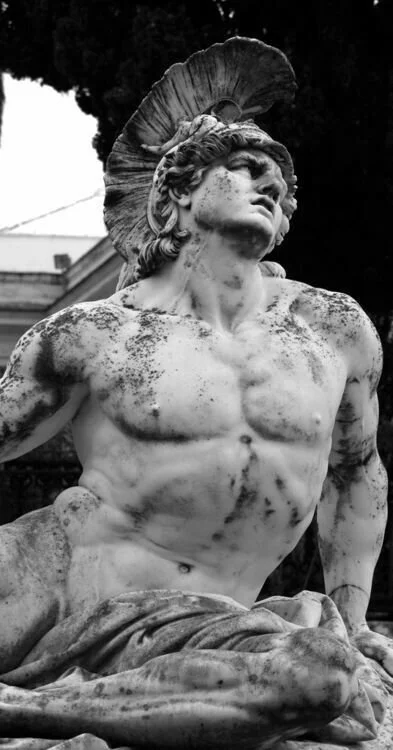The Story of Achilles, Reforged in Melody
Melody of War is a mythic concept album that reimagines the Trojan War through a deeply personal, character-driven lens — centered on Achilles, his complex relationship with Patroclus, and the immense mythic world that surrounds them. Blending ancient legend with modern music, this two-hour, three-act narrative spans their entire journey: from innocent boyhood on the shores of Phthia to the fires of war, the death of Achilles, and, at last, their reunion in the underworld. Though Achilles is the emotional core of the piece, this is not a solitary spotlight.
Melody of War is an ensemble epic, rich with iconic figures like Odysseus, Agamemnon, Hector, Helen, Briseis, Ajax, Thetis, Zeus, Hera, Athena, and many more. The gods watch and manipulate from above like playwrights, while mortals below struggle with fate, grief, ambition, and the desperate hope to be remembered. Every major hero and divine force from the Trojan mythos plays a vital role in shaping the story’s rising tension and tragic resolution.
Music, Myth, and Mortality
Musically, the project fuses orchestral scoring with modern genres — cinematic strings, thundering drums, electronic synths, rock guitars, haunting folk textures, and theatrical vocal arrangements. The sound design mirrors the myth: ancient bones with modern flesh. Visually, we aim for a heightened, stylized aesthetic. The world of Melody of War is overwhelmingly literal, but at times, symbolic and evocative — an operatic stage, a dreamscape of sand and smoke and memory. Moments are often real, but may occasionally lean towards surreal or poetic, reflecting the internal state of characters as much as physical reality. Time can stretch or freeze. The chorus of the dead may speak. Memories may interrupt the present.
The Creative Vision
Of all the ways this story has been told, none have fully captured Achilles as a fabled warrior while also focusing on his relationship with Patroclus. In the movie Troy, for example, we see him purely as an unstoppable fighting force. In the book A Song of Achilles, told through the eyes of Patroclus, we see Achilles only from that perspective. Melody of War captures both. There are moments of brutal warfare, where Achilles showcases his demigod strength, speed, and mercilessness, but there are also moments of tender, loving stillness with Patroclus. Achilles, as a result, becomes an entirely 3D character throughout the piece. In addition to this, despite the time that these stories originally occurred, (or were written down/recorded), many of the themes, thoughts, feelings, challenges, etc. salient for those heroes of old are present in our lives as well.
Some questions include:How can I make my legacy last?
What is the cost of greatness?
Is there such a concept as destiny, and how does that intermingle with free will?
Is vengeance ever enough?
How do I choose what to pursue in life?
Why should I respect an authority when I believe I know better?
What am I willing to sacrifice for love?
Can people give you respect, or can you only give it to yourself?
These questions feel ancient, but also deeply modern. That’s the magic of myth: it returns to us in new forms, carrying old truths. And in Melody of War, we offer one more retelling — not to change the myth, but to sing it in a new key.


